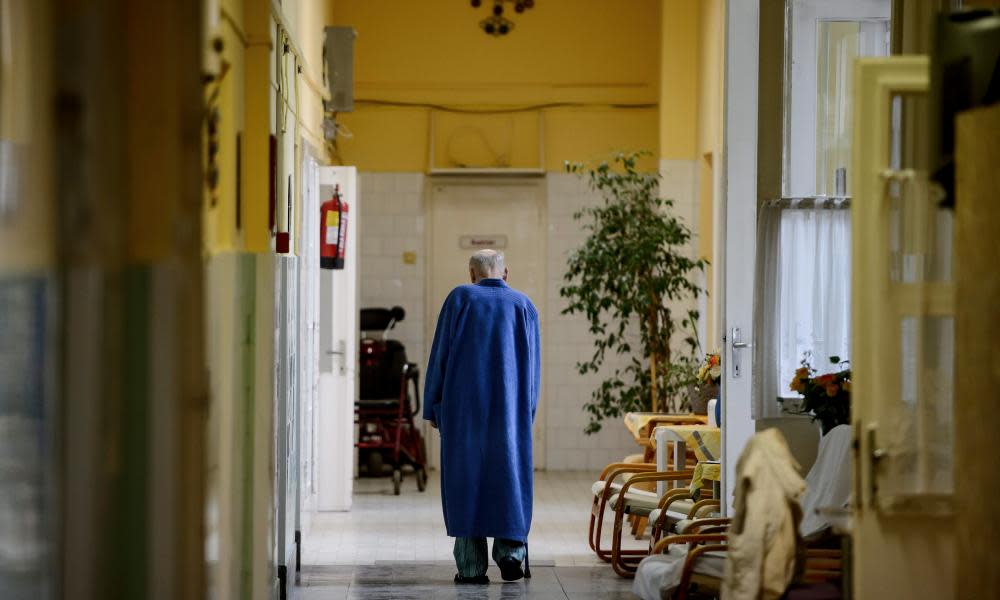Dear Life by Rachel Clarke review – somewhere towards the end

Dying is what we do. Rich and poor, quickly or slowly, in pain or in peace, young and old and somewhere in between, we all come to our own sure extinction. But often, our own dying is not what we talk about, prepare for, live with or recognise as always waiting for us: “Nothing more true,” as Philip Larkin wrote in his terror-struck Aubade.
In part because of this human instinct to deny what is certain and yet can feel like a scandalous impossibility, dying can be a terrifying, farcical, violent and lonely business. It’s become easier to live longer, harder to die well. Death most often takes place in a hospital ward, frequently alone in a curtained bed, or with doctors heroically striving to bring the flickering self back from the brink: drugs and knives and needles and machines and masks and blood and the breath and agony and the heart failing and the body not allowed to give up. For hospitals are largely places of cure, of restoring people to life and to time. Death is a medical failure.
There comes a point when it is right for time to stop. Rachel Clarke works with the dying, for the dying. A doctor specialising in palliative medicine, she spends her days in a hospice where people come when all hope of a cure has gone. In her heart-wrenchingly tender and candid account of being alongside people at their endings, she shines a light into the world of the dying. Where her job used to be about saving lives and she often felt like she was battling in a war zone, now it is about accompanying people to their final threshold when the long fight is over, in a place of safety. While medical science remains imperative (with the miracles of modern drugs, few people need to die in agony), equally important is the imaginative kindness that the task requires, the imperative of seeing the patient as a vulnerable and beloved person, the ability to witness and sometimes carry the anguish of others and the great endeavour of enabling those in her care to meaningfully live until they painlessly cease.
Clarke repeatedly describes her own fallibility: the mistakes she makes, the fear and recoil she feels
Clarke is unerringly good at telling stories and Dear Life is full of them – of the young woman who 24 hours before her death joyfully got married in the hospice and died in her new husband’s arms still dressed in her white chiffon; of the mother who was shown by one of the staff how to wash her 19-year-old son’s dead body; of the distressingly agitated old man who found peace once the double doors had been opened and he had been turned to face the garden – but overarching them all are two larger stories.
One (mirroring Atul Gawande’s Being Mortal, in which the death of a parent is the organising narrative) is the death of Clarke’s adored father, a doctor and her role model and mentor. Her book opens with the diagnosis of his cancer and it closes with his beautifully managed ending, at home with his family around him. In this way, the chapters track her growing understanding of what it is to be frail and mortal creatures.
The other is how Clarke, who in her 20s worked as a news reporter, became a doctor and then a specialist in palliative care. In much of the first half of Dear Life, she describes her time in frenzied A&E departments, “amid the stabbed, the shot, the broken-boned, the overdosed, the dog-bitten, the knived, the burned and the impaled”, where injury and death can seem random and brutal, endangered bodies are stacked in corridors, overworked and often exhausted doctors and nurses run rather than walk and a handful of seconds can make all the difference.
Related: Atul Gawande: ‘Why, as you become older and sicker, should you give up your autonomy?’
To work in a hospice felt like a welcome alternative to the traditional medical paradigm, “one with people, not diseases, at its heart”. Curiously, once she is writing about palliative care, not only does the crisis and clamour of acute medicine fade; so too the body, in all its mess and indignity and many frailties, recedes. Time slows down as it runs out. It is the gallant human heart that takes centre stage.
Clarke repeatedly describes her own fallibility: the mistakes she makes, the fear and recoil she feels, the cases that go wrong. She lets us see her as a doctor, but also as a daughter, a wife, a mother. The compartments are not neat: she works as a scientist, but also as a counsellor, a teacher, a priest, a fellow human being. Her heart is in her job. There are many thrilling doctor-as-hero accounts, and they are often by men; there are fewer doctor-as-healer ones, and those I know of share the kind, unironic and emotionally invested quality of Dear Life.
The title is appropriate. Clarke is writing about dying, but also, eloquently, about living. Saul Bellow wrote that death is “the dark backing that a mirror needs if we are to see anything”: it gives life its value and time its precious meaning. In Clarke’s hospice, on good days, she sees her patients living as they approach their ends, freshly aware of life’s everyday loveliness. And the passages in her book that made me want to weep were not the ones about dying, but the ones about living, loving, learning how to say goodbye.
• Dear Life: A Doctor’s Story of Love and Loss by Rachel Clarke is published by Little, Brown (£16.99). To order a copy go to guardianbookshop.com. Free UK p&p over £15


